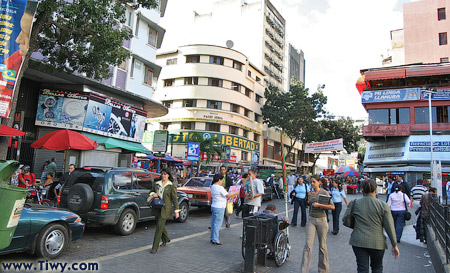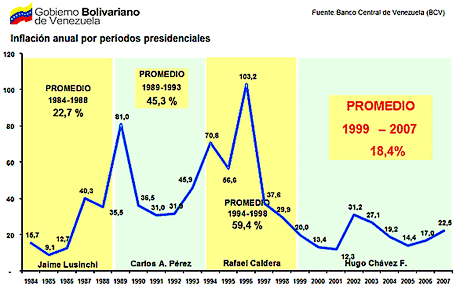About Chavez and «narcissism-Leninism»

An article by Mikhail Baklanov - «Hugo Chavez has built narcissism-Leninism», published on July 5 at site www.bfm.ru, can be considered as a typical example of this.
 |
«This demonstration of military power in the country, which no one will attack, along with a demonstration of the worst in the region economic characteristics produces a strong impression,» - continues the Russian journalist.
At the moment there is only one country the world which is being attacked - it's Libya, - and if you follow the logic of the author, it is only Libya that can show us its military power in parades. If the author had in mind that Venezuela is not threatened by attack, we can recall that over the past twenty years, four states in Asia, Europe and Africa suffered the direct aggression of the United States and its allies. At that, half of them were major producers of oil, and another country - Yugoslavia - at the time of the aggression was ruled by an elected democratic government, with the existence of legal opposition.
Finally, I would remind the author that the United States have not only unilaterally stopped maintenance of the Venezuelan F-16s, terminating the delivery of spare parts to them, but also put pressure on other countries to prevent them from participating in the modernization of the Venezuelan armed forces - or directly forbade them to do it. So, after a veto from Washington, Israel and Brazil refused to upgrade Venezuela's F-16 fighters and to supply Venezuela trainer aircraft. For the same reason, Spain has not been able to build several ships for the Venezuelan Coast Guard (partial way out was found due to the exclusion of the components produced in the U.S. from their design - so now the produced in Spain ships arrive in Venezuela). And only in the case of Russia, Belarus and China, the U.S. had no levers that would prevent arms sales to Venezuela – although the attempts to exert pressure on Russia also took place.
If no one in the United States seriously considers the possibility of invasion to Venezuela - why do they take such vigorous actions to prevent it from owning modern weapons?
But let’s move from arms to oil.
«According to the Central University of Caracas, for 12 years of Chavez power in Venezuela, the oil revenues came to the astronomical sum of $ 700 billion, which exceeds the Venezuelan oil revenues over the previous quarter of the century» - shocks us Mikhail Baklanov.
Most of the teachers of the Central University of Venezuela (the author apparently has in mind this university – as the University under such name does not exist) are in opposition to the government of Chavez. Besides, I could not find the referred by the Russian author data - but they are easy to verify according to the data of open public statistical sources.
The following table shows the average oil production in Venezuela (in thousands of barrels per day) from 1999 to 2010:
| 1999 | 2000 | 2001 | 2002 | 2003 | 2004 | 2005 | 2006 | 2007 | 2008 | 2009 | 2010 |
| 3126 | 3239 | 3142 | 2895 | 2554 | 2907 | 2937 | 2808 | 2558 | 2613 | 2438 | 2471 |
The following table reflects the average cost of a barrel of Venezuelan oil (in U.S. dollars) for the same period:
| 1999 | 2000 | 2001 | 2002 | 2003 | 2004 | 2005 | 2006 | 2007 | 2008 | 2009 | 2010 |
| 16 | 26 | 20 | 22 | 26 | 35 | 48 | 52 | 85 | 87 | 57 | 72 |
By a simple calculation we can see that the total value of oil produced in Venezuela for the years 1999-2010 approximately comes to 540 billion dollars - but not 700 billion, as it is told to the Russian readers. It must be borne in mind that not all produced oil was sold for dollars. After all, Venezuela consumes a significant portion of produced oil for its own needs. According to the CIA World Factbook, in 2009 the consumption of oil in Venezuela amounted to 740 thousand barrels per day - that is, nearly a third of domestic production. Domestic prices of petroleum products are such that every liter of gasoline sold at gas station in the country at a cost of several cents per liter (compare this with the Russian and Ukrainian prices!), brings the country a loss. That is, in fact, even the figure of 540 billion dollars - as the income derived from Venezuela's oil exports - is overstated almost by a third.
As a famous American Latinamericanologist Andres Oppenheimer noted in an article in the Spanish El Pais, «Chavez is the author of a real economic miracle: despite the unprecedented oil boom in the history of Venezuela, the economy of the country has been brought to the end of the line» - the Russian journalist further narrates.
«A famous American Latinamericanologist Andres Oppenheimer» is known, in particular, by the fact that in 1992 he wrote a «prophetic» book entitled «Castro's Final Hour». In case of Venezuela, he also apparently got worked up, telling about the «unprecedented oil boom in its history». The real oil boom here was in the seventies, when oil prices at times reached 60 dollars per barrel. Given the depreciation of the dollar over the past 30-40 years it is much more than the current prices. The population of Venezuela was 10 million in 1970 and approximately 15 million in the early eighties - and not 28 million, as it is today. It was during those years, that Caracas and other Venezuelan cities were filled with ultra-modern office and residential buildings and the streets with plenty of new cars. In those years the middle class prospered, for the representatives of whom it was common to fly to Miami for shopping over the weekend, and a supersonic passenger airliner «Concorde» made regular flights between Caracas and Paris. However, many people in Venezuela languished in poverty, some were illiterate, and the infrastructure of the country except for the capital, has practically failed to improve, including, because of rampant theft of successive Social Democratic and Social Christian governments. Suffice it to say that to travel from west to east the passenger and freight transport for decades had to pass through Caracas, increasing traffic jams and chaos on the roads of the congested capital. The elementarily needed bypass is only being built now.
«Things are so bad that Venezuela, which is among the world's largest oil exporters, has to buy electricity from neighboring Colombia», - tells us Mikhail Baklanov.
According to the CIA World Factbook, electricity consumption per capita in Venezuela is more than three times higher than in Colombia. In particular because the electric appliances are much less accessible for the average Colombian, than for a Venezuelan - and a much larger percentage of the Colombian population simply does not have access to electricity. Venezuela is the second highest electricity consumption per capita country in Latin America, in this figure yielding only to Chile.
So, are the things so bad? Of course, you can resent the fact that Venezuela has to import electricity from Colombia - but I recollected the perestroika hysterics over the fact that such industrial country as the USSR had to purchase grain from abroad – while the tsarist Russia (backward agrarian country) «used to feed all Europe with grain». With this they hush up the fact that the tsarist Russia used to export grain, even during the regular crop failures and famines, and no one remembered the words «though short of food, we’d export» uttered on this occasion by the tsar’s minister.
«The main achievement of the ruling United Socialist Party of Venezuela as assured by its leadership, is the reduction of poverty in the country from 45 to 28%. Even if we accept these official data at face value, which are not confirmed by the independent Venezuelan economists, it should be noted that this is not a unique achievement. During the same period the Argentine government, without any socialist experiments and no windfall from oil reduced the poverty in the country from 45% to 11%, a similar pattern is in Chile (respectively, from 20% to 11%) and Brazil (38% and 25%)», - reports Baklanov.
And modestly fails to mention the fact that the data is not confirmed by unnamed «independent Venezuelan economists,» and are confirmed by independent study jointly conducted by the UN and the Organization of American States (OAS).
There, on page 96, you can find the data on changes in percentage of population living in pobreza (poverty) and indigencia (misery) from 1999 to 2008. Percentage of population living in poverty in Venezuela has declined over this period from 49% to 28% - that is, almost twice, which is one of the best among all the above countries. At the same time, in Columbia, which liberal critics of the Venezuelan government like to cite as an example, these figures were 55% and 47%. In Uruguay, the proportion of people living in poverty and has increased at all (from 9% to 14%), while in average for Latin America, it has decreased from 44% to 33%. In other words, in 1999, this percentage was slightly higher in Venezuela than the average for the continent and in 2008 was much lower. Decrease in the percentage of population living in misery in Venezuela is even more noticeable at the general background - from 22% to 10% in Venezuela and from 19% to 13% on the average in Latin America.
«While the Latin American economy grew at an average of 6% per year in 2010, the GDP of Venezuela fell by 1.6% after the 2009 registered a decline of 3%» - continues to play with statistics bfm.ru.
These data correspond to reality. However, nothing has been said about the fact that from 2004 until 2008 inclusive, Venezuela's GDP grew steadily - by 17% in 2004, by 9% in 2005, by 10% in 2006, by 8% in 2007 and by 5% in 2008. Of course, record growth of 2004 would not be possible without recess of 2002-2003, caused by a three-month political strike in the oil industry. But it shows what wrong impression may arise if one only considers the data for several years, especially in such a country as dependent on oil exports Venezuela.
«In all regions of Venezuela, but for the capital, where authorities are trying to maintain the illusion of prosperity, there are daily rolling blackouts. At first, Chavez's regime has explained it by drought, but experts say that the reason is far more trivial: over the last decade virtually no money was invested in energy infrastructure» - Mikhail Baklanov continues to trample on Chavez.
Yes, the energy crisis in Venezuela is a reality. Often occurring power cuts in the province disrupt businesses and work of institutions, traffic, disable electrical equipment and home appliances, cause irritation of the population and reduce the number of supporters of Chavez. Over the past decade, thanks to the already mentioned sharp decrease of poverty and misery in Venezuela, the number of home appliances held by the population has greatly increased. As a result the growth of electricity consumption has outstripped the natural population growth. Obviously, the Chavez government did not foresee such a side effect of measures taken to reduce poverty - which, along with breakdowns of commissioning periods of several power plants (e.g. hydro-electric power station «Tocoma» on the Caroni River is being built with a delay of several years, and currently its commissioning is expected in 2012), that led to the current energy crisis. Of course, the government and Chavez himself responsible for the situation. But allegations, that the energy infrastructure of the country under Chavez has not seen any investments, is an outright lie. Over the past decade several thermal and hydro-electric power stations have been put in operation. The cost of construction (already started under Chavez) of only one of the above HEPS «Tocoma» with the projected capacity of over 2000 megawatts, is nearly $ 6 billion! But even this astronomical sum for the post-Soviet realities, does not save Chavez from unsubstantiated lies of right-winged journalists.
«Most Latin American countries have inflation rates not exceeding 10%. By the time Chavez came to power in Venezuela, inflation was 12%, last year it jumped to 27%» - we read in article of Mikhail Baklanov.
And it is also a lie. In 1998, at the end of which Chavez won the presidency, the inflation rate in Venezuela was 30%. Below is a very interesting chart, which reflects the dynamics of inflation in Venezuela under Chavez and his predecessors. Of course, inflation in the era of Chavez, which ranged from 14% to 31%, is a significant problem. But looking at the chart, we can see that it is not so high compared to what it used to be before.

Besides, speaking of the country's economic performance, it is difficult not to mention the unemployment. The Chavez government inherited a country where 14% of workers had no work. In 2003, after a paralyzing the country strike, this figure rose to 19%. Last year, Venezuela completed with a 7% unemployment rate - but Mikhail Baklanov chose not to report on this subject, preferring to fantasize on its external debt:
«Latin America as a whole is experiencing an unprecedented boom of foreign investments. The situation in Venezuela is quite the opposite: at the background of the growing flee of capital, the country's external debt rose from $ 35 billion in 2001 to 58 billion dollars in 2010. All this data is of the UN Economic Commission for Latin America and the Caribbean (CEPAL).
In fact, Venezuela's public external debt is about $ 35 billion, and in 1998 it was 23 billion dollars. But in 1998, the currency reserves totaled only $ 10 billion. Whereas, by the end of last year, they amounted to about $ 30 billion - that is, almost equal to the value of the public external debt.
It does not mean at all that Venezuela's economy faces no problems and the Chavez government perfectly copes with its responsibilities. The challenges are many - and often the government does not confront them in the best way. However, one definitely should not judge the situation in Venezuela by the articles of such authors as Mikhail Baklanov, with their pronounced «class allergy» to Chavez.
Their incompetence is slipping even in minor moments, like the references to «Nency Chavez, the former first lady of the country.»
Nancy (but not «Nency») Colmenares has never been the «first lady» of Venezuela - as Chavez became the president, when he was divorced from her and married to Marisabel Rodriguez. The last blunder of the author, apparently, is attributed to his elementary unwillingness to spend at least a little time to find out the information about the country, which he undertook to write about. Although one can hardly explain all the accumulation of juggling, manipulation and outright lies, collected in his article.